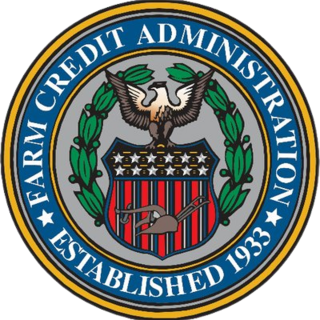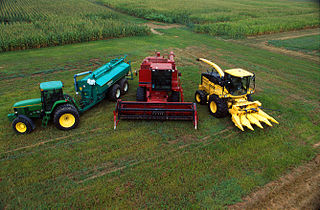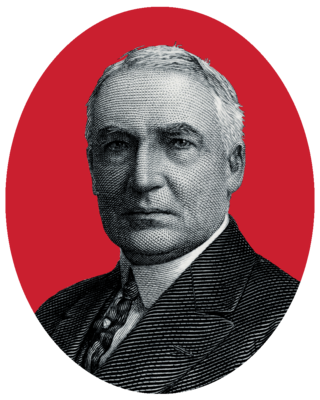Related Research Articles

The Farm Credit Administration is an independent agency of the federal government of the United States. Its function is to regulate the financial institutions that provide credit to farmers.

The United States Department of Agriculture (USDA) is an executive department of the United States federal government that aims to meet the needs of commercial farming and livestock food production, promotes agricultural trade and production, works to assure food safety, protects natural resources, fosters rural communities and works to end hunger in the United States and internationally. It is headed by the secretary of agriculture, who reports directly to the president of the United States and is a member of the president's Cabinet. The current secretary is Tom Vilsack, who has served since February 24, 2021.

An agricultural subsidy is a government incentive paid to agribusinesses, agricultural organizations and farms to supplement their income, manage the supply of agricultural commodities, and influence the cost and supply of such commodities.
The Nonpartisan League (NPL) was a left-wing political party founded in 1915 in North Dakota by Arthur C. Townley, a former organizer for the Socialist Party of America. On behalf of small farmers and merchants, the Nonpartisan League advocated state control of mills, grain elevators, banks, and other farm-related industries in order to reduce the power of corporate and political interests from Minneapolis and Chicago.

The National Grange, a.k.a. The Grange, officially named The National Grange of the Order of Patrons of Husbandry, is a social organization in the United States that encourages families to band together to promote the economic and political well-being of the community and agriculture. The Grange, founded after the Civil War in 1867, is the oldest American agricultural advocacy group with a national scope. The Grange actively lobbied state legislatures and Congress for political goals, such as the Granger Laws to lower rates charged by railroads, and rural free mail delivery by the Post Office.

The American Farm Bureau Federation (AFBF), more informally called the American Farm Bureau (AFB) or simply the Farm Bureau, is a United States–based 501(c)(5) tax-exempt agricultural organization and lobbying group. Headquartered in Washington, D.C., the Farm Bureau has affiliates in all 50 states and Puerto Rico. Each affiliate is a Farm Bureau, and the parent organization is also often called simply the Farm Bureau.

The 1920 Republican National Convention nominated Ohio Senator Warren G. Harding for president and Massachusetts Governor Calvin Coolidge for vice president. The convention was held in Chicago, Illinois, at the Chicago Coliseum from June 8 to June 12, 1920, with 940 delegates. Under convention rules, a majority plus one, or at least 471 of the 940 delegates, was necessary for a nomination.

Frank Orren Lowden was an American Republican Party politician who served as the 25th Governor of Illinois and as a United States Representative from Illinois. He was also a candidate for the Republican presidential nominations in 1920 and 1928.

The 1928 Republican National Convention was held at Convention Hall in Kansas City, Missouri, from June 12 to June 15, 1928.

The 1924 Republican National Convention was held in Cleveland, Ohio, at the Public Auditorium, from June 10 to 12.

Lowden State Park is an Illinois state park on 207 acres (84 ha) in Ogle County, Illinois, United States. It is named for Governor Frank Orren Lowden, who served from 1917 to 1921, and is home to The Eternal Indian, a statue by Lorado Taft. Along with eleven other parks, it was briefly closed after budget cuts in 2008.

Alexander Legge was a prominent American business executive, serving as president of International Harvester from 1922 to 1933. He performed public service during World War I on the War Industries Board and at the Versailles Peace Conference, and again during the Great Depression on the Federal Farm Board.

Charles Adkins was a farmer and U.S. Representative who lived in Illinois.

Orion Samuelson is a retired American broadcaster, known for his agriculture broadcasts and his ability to explain agribusiness and food production in an understandable way. He was inducted into the Radio Hall of Fame in 2003.
Henry Charles Taylor was an American agricultural economist. As an early pioneer in the field, he has been called the "father of agricultural economics" in the United States. Taylor established the first university department dedicated to agricultural economics in the United States in 1909 during his time at the University of Wisconsin–Madison. He also had a brief but very influential career in the United States Department of Agriculture from 1919 to 1925, where he helped reorganize its offices and became head of the new Bureau of Agricultural Economics. Coming from a rural farm community himself, Taylor's foremost goal was always to try to improve the living conditions of farmers.
The 1933 Wisconsin milk strike was a series of strikes conducted by a cooperative group of Wisconsin dairy farmers in an attempt to raise the price of milk paid to producers during the Great Depression. Three main strike periods occurred in 1933, with length of time and level of violence increased during each one.

The production of corn plays a major role in the economy of the United States. The US is the largest corn producer in the world, with 96,000,000 acres (39,000,000 ha) of land reserved for corn production. Corn growth is dominated by west/north central Iowa and east central Illinois. Approximately 13% of its annual yield is exported.

Republican candidate Herbert Hoover won the state of Illinois in the 1928 United States presidential election, and would emerge victorious from the overall election. State voters chose 29 representatives, or electors, to the Electoral College, who voted for president and vice president.
James Plummer Day was an American farmer, agricultural science and education advocate, and Dakota territorial politician. He served as a Councilman for the 16th Dakota Territorial Council in 1885, was a board member and president of the Dakota Agricultural College Board of Trustees, and was an American Civil War veteran.
This is a list of endorsements for declared candidates in the Republican primaries for the 1928 United States presidential election.
References
- ↑ "Become a Corporate Partner". Farm Foundation. Retrieved 2022-10-09.
- ↑ “LOWDEN WILL AIDS TENANT FARMERS; Ex-Governor of Illinois Leaves Plantation of 21,000 Acres in Arkansas to Farm Foundation,” New York Times, April 4, 1943 (fee access required)
- ↑ “Schafer Tells Farm Foundation to Get Ready for Breakthroughs,” Domestic Fuel Magazine, October 16, 2008
- ↑ ""Report looks at complex factors that drive food prices," Biofuel Review, July 29, 2008". Archived from the original on September 30, 2011. Retrieved October 28, 2008.